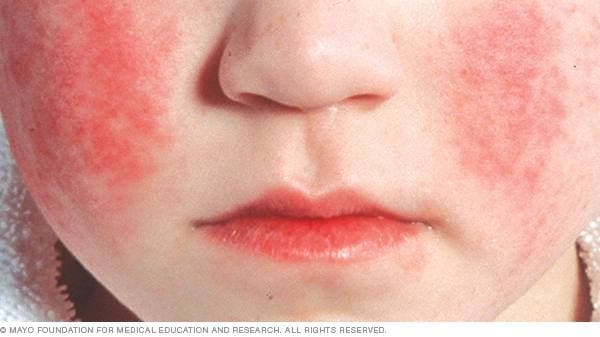Diagnosis
About half of adults are immune to parvovirus infection, most likely because of a previous, unnoticed childhood infection. People who are at risk of severe parvovirus complications might benefit from blood tests that can help determine if they're immune to parvovirus or if they've recently become infected.
Treatment
For an uncomplicated parvovirus infection, self-care treatment at home is generally sufficient. People with severe anemia may need to stay in the hospital and receive blood transfusions. Those with weakened immune systems may receive antibodies, via immune globulin injections, to treat the infection.
Self care
Self-care treatment is aimed primarily at relieving signs and symptoms and easing any discomfort. Make sure you or your child gets plenty of rest and drinks lots of fluids. Acetaminophen (Tylenol, others) may help to relieve temperatures of more than 102 F (39 C) or minor aches and pains.
Use caution when giving aspirin to children or teenagers. Though aspirin is approved for use in children older than age 3, children and teenagers recovering from chickenpox or flu-like symptoms should never take aspirin. This is because aspirin has been linked to Reye's syndrome, a rare but potentially life-threatening condition, in such children.
It's impractical and unnecessary to isolate your sick child. You won't know your child has parvovirus infection until the rash appears, and by that time, your child is no longer contagious.
Preparing for your appointment
Most people with parvovirus infection don't seek medical attention. You may want to talk to your family doctor if you or your child has been exposed to parvovirus and has an underlying condition that increases the risk of complications.
What you can do
Before the appointment, you may want to write a list that includes:
- When and how you or your child was exposed to parvovirus
- A detailed description of symptoms
- Medical problems that run in your family
- Medical problems you or your child has had in the past
- All the drugs and supplements you or your child takes
What to expect from your doctor
During the physical examination, your doctor will pay special attention to any skin rashes. If you're a female past puberty, your doctor may ask if there's any chance you're pregnant.
